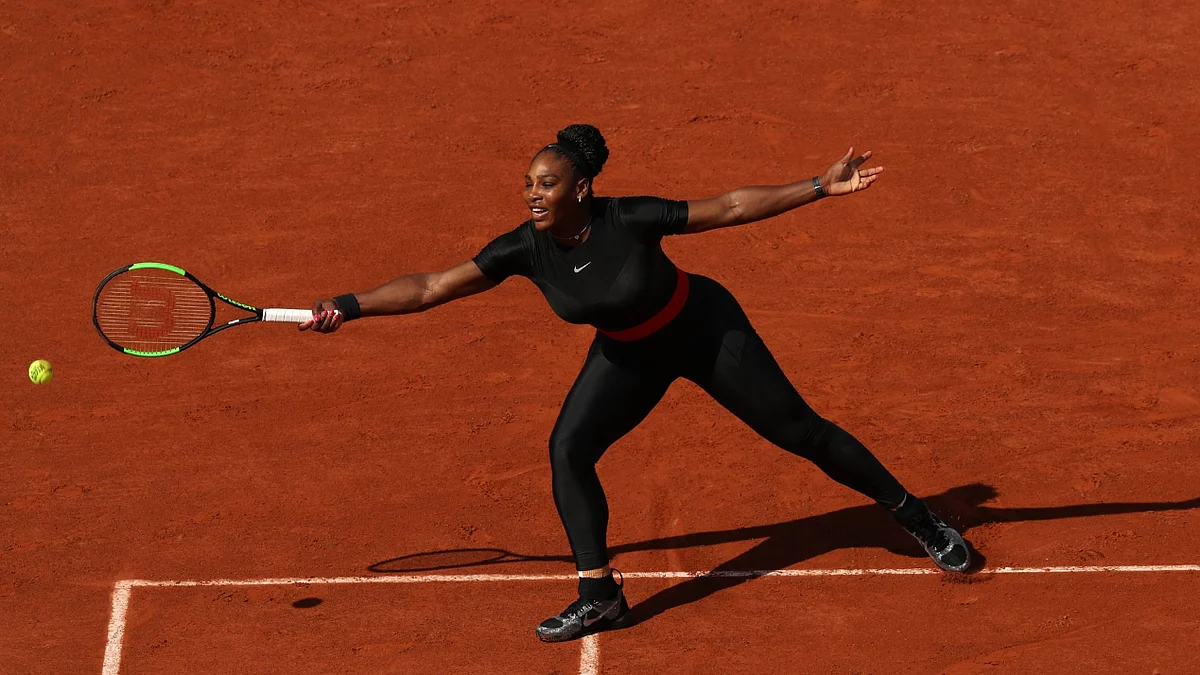Hey French Open, Serena Williams is the Game – In a Catsuit or Not
The focus on Williams’ French Open catsuit is nothing but, pardon my French, sexist and racist bullshit.

advertisement
In May 2018, Serena Williams, arguably the greatest tennis player of all time, returned to the French Open after her maternity leave. Winner of 23 Grand Slam titles, Williams had nearly died while giving birth to her daughter in 2017. As she strolled on the court only nine months later, ready to compete at the highest level of the sport, she wore a black catsuit. An outfit that made her feel like a “warrior princess” and more importantly, was life-saving. It was a compression suit, promoting blood circulation and preventing formation of blood clots; a health condition that has nearly taken her life twice in the past.
Well, who would have a problem with that, right? Well, it seems the French Open president Bernard Giudicelli. In a magazine interview, he said that the tournament is now imposing a dress code, singling out Williams’ catsuit as an example of players’ uniforms having “gone too far.”
“It will no longer be accepted. One must respect the game and the place,” Giudicelli said.
Serena Williams: A Symbol of Blackness and Inspiration to Young Mothers
In a press conference at Wimbledon 2018, Serena Williams said “Every single match I play whether I'm coming back from a baby or a surgery, it doesn't matter, these young ladies bring a game I've never seen before. That’s what makes me great. I always play everyone at their greatest, so I have to be greater."
That quote is not arrogance. It’s a frank admission from an athlete confident in her unique prowess and the pressures that come from being an elite athlete. It also symbolises what Serena Williams — and her sister, Venus Williams — mean to world tennis. Before their explosive entry, tennis was a game dominated by white players and old-fashioned ideas of ‘propriety’ when it came to the women’s game. Suddenly, players had to confront two American sisters in dreadlocks who were not only as black as they get, but also powerful in both their game and their hunger to win. The Williams’ sisters and Serena especially, singlehandedly changed the way future players on tour played the game.
Serena Williams is synonymous not only with greatness, but also as a shining example of inspiration to young black girls and women all over the world. She has faced racist insults for her body — being called a “man” and “too strong” — all her life. Her Australian Open win while she was pregnant and her return to tennis in a spectacular manner after nearly dying in childbirth, has proved to be an inspiration to young mothers everywhere.
From All-White Wimbledon to the Colourful French
Dress codes in tennis are nothing new. The Wimbledon is famous for being a traditionally all-white game, with players fined for violating the dress code. Apart from aberrations — resulting from fashion experimentation (ahem, Andre Agassi) and injuries — the players’ uniform in women’s tennis is confined to a skirt-frock combination. However, it’s not the first time that a catsuit has made an appearance on the tennis court. In 1985, Anne White wore an all-white catsuit at the Wimbledon, but she wasn’t singled out for apparently disrespecting the game and its place. So, what’s the problem?
The catsuit “ban” reinforces what any casual tennis follower knows perfectly well by now — Serena Williams stands out in the world of tennis with her unapologetic blackness, her confidence in her talent and the way she embraces her greatness. Because of which, she is a regular target. Whether in the form of being drug tested more than any other tennis player in the world or being called a “man” for her powerful shape.
But here’s the thing. Serena Williams can play a Grand Slam tournament in unicorn pyjamas with her daughter, Olympia swinging from her lap, and she will outplay all the women on her tour. The debate is no longer about Serena Williams’ greatness. It’s about how much more tennis will disrespect one of its greatest players.